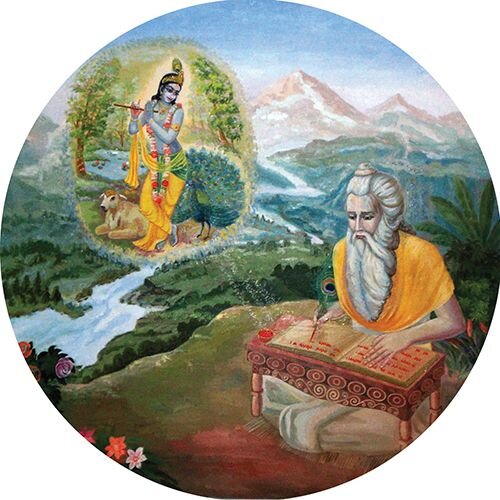
Srimad-Bhagavatam and the Search for Fulfillment
“Simply by one’s giving aural reception to Srimad-Bhagavatam, the feeling for loving service to Krishna, the Supreme Personality of Godhead, sprouts up at once to extinguish the fire of lamentation, illusion and fearfulness.”
– Srimad-Bhagavatam 1.7.7
by Vraja Vihari Dasa
WHAT IS COMMON to Elvis Presley, Robin Williams, Kurt Cobain, Virginia Wolf, Marilyn Monroe, Guru Dutt, Jimi Hendrix, Ernest Hemmingway, Nafisa Joseph, and Divya Bharati? You might not recognize all these people, but all of them had their claim to fame before their tragic and premature death, often by suicide. The cameras flashed, people eulogized them, and suddenly it was all over. While die-hard optimists might shrug off these examples as exceptions to the general rule of money and fame leading to happiness, careful observation reveals otherwise. Unhappiness is a common feature of modern life, even while the rich and famous continue to put up a fasade and assure us all’s well.
We find in Vedic history a classic parallel to the modern tragedy of discontentment. The most accomplished writer and poet of all time sat on the bank of the river Saraswati wondering where he’d gone wrong. Srila Vyasadeva had composed not only the voluminous Vedas, Mahabharata, and Upanishads, numbering over a million verses, but he had also delineated steps to achieve mastery in manipulating matter. The eight mystic perfections, such as becoming smaller than the smallest, getting whatever one wants at any time, and developing special skills to increase beauty and wealth, were all known to him. He would be renowned as the most proficient writer from then on, with no mortal coming close to his achievements.
Yet an emptiness engulfed his heart, and he pondered over the root cause of his dissatisfaction. Logically it didn’t make sense because, through his unparalleled works, he had immense access to all that one considers synonymous with happiness in this world.
As Vyasadeva sat despondent, Srila Narada Muni, his spiritual master, arrived on the scene. In an interesting conversation between them that’s elaborately described in the First Canto of Srimad-Bhagavatam, Narada teaches his disciple that real fulfilment comes only when we lovingly connect with and glorify Krishna, the Supreme Personality of Godhead. And as long as we are absorbed in the nonspiritual aspects of our lives, especially in the pleasures this world offers us, we’ll feel a gaping vacuum in our hearts.
Finding Nectar in Matter
Why is someone attracted to Bollywood, Hollywood, cricket, football, or politics? Or why does a mango or a dish of ice cream excite us? Because these phenomena contain a rasa – “juice” – that pulls us towards them. We are not usually pulled by the color or shape of the mango; it’s the essence carried by the fruit that tempts us. Whether relationships, news, events, hobbies, or whatever, practically everything of this world carries a rasa that makes it appealing.
Unfortunately, all rasa of this world follows the law of diminishing returns: the more we increase our consumption of something, the more we experience a decline in the satisfaction we derive from it. When you eat a sweet, initially you may crave more. But as you take a second and third helping, you’ll feel less desire for the sweet, and eventually you’ll stop consuming it. In a romantic relationship, couples go gaga over each other at first but soon realize it’s not easy to tolerate each other’s idiosyncrasies. Mushy expressions change to daily rifts and squabbles; soon the “juice” is out of the relationship.
Problems Worsened by the Mind
While everything in this world has a unique taste, it’s limited. The inherent attractiveness fades after a while. Besides, our mind has an inexhaustible appetite to feast on negative experiences. From a mixture of mostly happy events, it expertly picks up one unpleasant incident and chews it with the gusto of a teenage boy chewing bubblegum. After all the juice is sucked out of the gum, the boy can only blow a bubble to try to extend his happy experience. Similarly, the devil within us relishes a taste in grumbling over a failure, or a perceived injustice by the boss can abruptly throw us into an angry mood, which we also try to enjoy. Although the juice is out of the event, the mind, desperate for more, swells it and blows it far beyond proportion.
What would happen if the teenager were to inflate his bubble beyond a certain limit? It would explode onto his face. He’d then have to clumsily pick up each strand of the stuck gum. If we don’t check the mind’s bubble, which is often cut off from reality, it will likewise get stuck on our consciousness, requiring us to remove its sticky mess from our psyche, a task more difficult than removing bubblegum from our face.
Recently a leading publisher in India rejected my book proposal on a day that also saw me achieve many of my self-growth goals. I exercised, read scriptures, gave two talks, wrote for an hour, improved relationships with friends, learned poems, and much more. Still, the mind moaned: “Oh, I am unworthy, but this publisher is selfish, heartless, and opportunistic.”
The pessimistic self-talk often goes unnoticed by our higher awareness; we don’t realize its sinister presence in our inner world. Even the mind follows the law of gravity; we slip to lower consciousness, as if naturally. The mind’s tricks are real, and before we realize it, we plunge into quicksand. Fortunately, spiritual activities and connection to God offer us a healthy alternative to being victimized by the mind’s games.
Krishna: The Embodiment of all Rasas
A fish taken out of water will suffocate even if you give it the latest iPhone, designer jeans, or pizzas. Water is the natural environment for the fish; likewise, Krishna is the space where the soul finds shelter and safety. We belong to the spiritual realm and are part of God. The material world is foreign to us, and all endeavors aimed at satisfying our body and mind will only prove frustrating.
Narada Muni diagnosed the cause of Vyasadeva’s despondency in these (paraphrased) words:
“You have written many books, but in none of these have you sufficiently and exclusively glorified Krishna as the Supreme Personality of Godhead. All kinds of literature and activities that do not intend to glorify the most attractive pastimes of Krishna and please His transcendental senses can never satisfy us. Besides, I consider such pursuits to be a waste of precious time.”
Narada reasoned that we should refrain from squandering our rare and valuable human form of life by occupying our time and energy in bodily and mental activities. Our real identity transcends these bodily designations, and if we connect ourselves to Krishna, the supreme transcendence, we can experience a natural state of happiness.
As parts of the Supreme Lord, we constitutionally seek rasa. It is our desire to relish this taste that attracts us to enter any relationship or pursue any activity.
Krishna, the Supreme Personality of Godhead, is defined as akhila-rasamrita-mürti, the source and embodiment of all rasa. When we connect with Krishna, our taste increases with the passage of time.
This is in stark contrast to rasa contained in matter, which wanes with time. For example, devotees in the Hare Krishna movement chant the same Hare Krishna mantra daily. Some devotees have been chanting Hare Krishna for the last five decades. Imagine singing the same song or poem daily. Wouldn’t it get boring after some time? When you read the news, you want the latest. If I hand you last year’s newspaper, you won’t be interested. However, we daily read the same pastimes that Krishna performed five thousand years ago. And we don’t feel a need to tweak the storyline – say, by having Krishna descend from a helicopter to vanquish His enemy Kaliya. There is no need to change anything about Krishna. His rasa gets better with each day, and that’s because He’s the personification of all rasa.
We learn from Lord Chaitanya Mahaprabhu’s biographers that He heard the history of the great devotee Dhruva Maharaja many times and each hearing of the same narration from Srimad-Bhagavatam increased His spiritual joy. In contrast, when we watch the same movie or read a sports or film magazine more than a couple of times, we are saturated.
Srimad-Bhagavatam: Identical to Krishna
Srila Narada Muni therefore advised Vyasadeva to broadcast the messages of Krishna without hesitation. Thus Srila Vyasadeva composed Srimad-Bhagavatam at his most mature stage of realization. This work contains the immortal nectar (rasamrita) of Krishna and His dealings with various devotees. In each of the twelve cantos Vyasadeva described the pastimes of Krishna and His avatars in detail. Srimad-Bhagavatam is considered identical to Krishna. It is His literary incarnation. It gives us the same benefits we’d get from His direct, personal association.
Narada Muni predicted that sincere glorification of Krishna would cause a spiritual revolution in the impious civilization of the world. He assured Vyasadeva that descriptions of Lord Krishna, even if filled with literary discrepancies, would transform people’s hearts and fill their lives with unlimited happiness.
Srila Prabhupada’s Gift of Krishna
Srila Prabhupada reveals his own humble state of consciousness in one of his purports to the conversation between Narada Muni and Srila Vyasadeva:
We know that our honest attempt to present this great literature conveying transcendental messages for reviving the God-consciousness of people in general and respiritualizing the world atmosphere is fraught with many difficulties. Our presenting this matter in adequate language, especially a foreign language, will certainly fail, and there will be so many literary discrepancies despite our honest attempt to present it in the proper way. But we are sure that with all our faults in this connection the seriousness of the subject matter will be taken into consideration, and the leaders of society will still accept this due to its being an honest attempt to glorify the Almighty God.
The evidence of the potency in the honest presentation of Srimad-Bhagavatam is seen in Srila Prabhupada’s own preaching. In America, where Srila Prabhupada established his movement in 1966, he faced an audience that included mostly young people absorbed in sensuous pursuits, and many of them were addicted to truly harmful habits. Moreover, his English had a Bengali accent, and he was almost fifty years older than the boys and girls he was teaching. Yet he could transform their hearts in an almost magical way. Like a benevolent pied piper, he attracted thousands of young people by the love of Krishna he carried in his heart.
Despite the language challenges, Srila Prabhupada’s heart resonated with love for Krishna as he filled the world with Krishna’s message and love. The fortunate souls who were willing to tune in to these vibrations caught the transcendental infection of love of Krishna that Srila Prabhupada carried and distributed profusely.
In less than a dozen years, Srila Prabhupada spread the message of Krishna consciousness across six continents. As an ambassador of the spiritual world, he came to invite us to the beautiful world of Krishna, where the rasa of Krishna gives one succor and the strength to face the repeated onslaughts of the material energy. The pages of Srimad-Bhagavatam thus call us to experience Krishna rasa and fill the hole of our heart with the complete whole.
Vraja Vihari Dasa, a disciple of His Holiness Radhanath Swami, has served full time at ISKCON Chowpatty since 1999. He has an honors degree in economics and a master’s in international finance. He teaches Krishna consciousness to youth and the congregation and has written four books. You can read his daily reflections at www.yogaformodernage.com.
